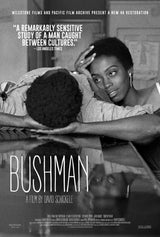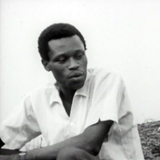Milestone Films
Bushman / Give Me a Riddle
THE ACCLAIMED FILM COMING OUT OF THIS YEAR'S IL CINEMA RITROVATO (Bologna), CINEMA REVISITED (Bristol, UK), VIENNALE (Vienna), and IDFA (Amsterdam)
Bushman (1971) has been restored by the University of California, Berkeley Art Museum and Pacific Film Archive and The Film Foundation. Funding provided by the Hobson/Lucas Family Foundation. Additional support by Peter Conheim, Cinema Preservation Alliance. A Milestone Film & Video/Kino Lorber release. 75 minutes. B&W.
1968: Martin Luther King, Robert Kennedy, and Bobby Hutton are among the recent dead. In Nigeria, the Civil War is entering its second year with no end in sight. In San Francisco, the adventures of Gabriel, a young Nigerian reflect tribal, personal, and racial frictions during the tumultuous sixties. Truth is stranger than fiction in BUSHMAN, a rare sort of film portrait, part document, part imagined - poetic in its approach to real events.
These amazing “lost” films, GIVE ME A RIDDLE and BUSHMAN, tell two tales of strangers in a strange land.
GIVE ME A RIDDLE is a 1966 documentary of Schickele and his friend Roger Landrum's experiences as members of the Peace Corps in Nigeria. it was a golden age after its independence in 1960 and before the Civil War in 1967— full of hope and cultural ferment. Schickele is welcomed as family by the villagers, including his college-educated friends Paul Eyam Nzie Okpokam, Gabriel Ogar, and Manze Ejiogu. Scenes cut by the Peace Corps in the official version are now back in the Pacific Film Archive's 2K scan off of Roger Landrum's personal 16mm print.
With BUSHMAN, In 1968, Paul Okpokam came to America and Schickele wanted to make a film of his Nigerian friend's experience coming to teach at San Francisco State College. A docudrama of Okpokam’s experience as the “other” in a tumultuous time of cultural revolution, he is seen through the prism of American racism and exoticism. But the film turns on astonishing real-life events as Okpokam is falsely accused of terrorism during events at the San Francisco State College strike of that year, thrown in prison for a year, and then deported as an undesirable.
The films together are remarkable portraits of two cultures during momentous times.
“My personal favorite festival discovery (the soundtrack! the street-level cinematography!) even before its narrative abruptly breaks down following the detention and eventual deportation of its main actor. Gabriel (Paul Eyam Nzie Okpokam) is a well-educated Nigerian observing the foibles of contemporary American Black culture with an outsider’s incisive eye, yielding a vibrant snapshot of the nation’s racial politics—when the director’s voice intrudes to narrate star Okpokam’s enraging fate, and the film morphs into a documentary. The rupture in form cannot but occur with a complacency-shattering jolt—yet another of this festival’s myriad examples of cinema’s ability to encode little packages of explosive revelation into its fabric like so much TNT, just waiting for the next viewer to trigger another real-time detonation.” — Jennifer Kiang, Film Comment
“A rare sort of film portrait, part document, part imaginary - poetic in its approach to real events. It describes the experiences and misadventures of a young Nigerian, named Gabriel, who comes to America for the first time, settles in the Bay Area and attends San Francisco State College. One is immediately struck by the exciting juxtaposition of African outlooks and California urban life. For the first time in American cinema, an educated African elucidates in a no-nonsense manner the bewildering ineptness of American society to live humanistically.” – Film Critic and Educator Albert Johnson
An Explanation of Home, Classroom, and Public Performance Rights
Through our distribution partner, Kino Lorber, Milestone provides a variety of licensing to suit all needs. Our standard institutional licensing packages are designed to provide colleges, universities and qualified non-profits with the best value for multiple uses, and our one-time community screening licenses allow any organization to exhibit high-quality films for a reasonable fee. Please note that all licensing carries restrictions on audience numbers and/or geographic range.
STANDARD INSTITUTIONAL LICENSING
- CLASSROOM RIGHTS allow unlimited use in face-to-face classroom situations for the life of the media, restricted to a single campus or location. Please note that this license doesn't include public screenings or digital transmission of any kind.
- PUBLIC PERFORMANCE RIGHTS (PPR) allow educational and nonprofit groups to exhibit our films to groups of 100 or fewer individuals where admission is not charged. The term of the public performance license is for the life of the DVD. However, if you intend to charge admission, expect an audience over 100, or publicly advertise the screening, then we ask that you contact us regarding an exhibition fee. Films purchased without Public Performance Rights are restricted for individual viewing or face-to-face teaching in the classroom only.
- DIGITAL SITE LICENSES (DSL) allow colleges, universities and nonprofits to locally host and stream to their community on a closed, password-protected system for the life of the digital file.
- K-12 PPR comes with limited performance rights so films can be shown in classrooms, at PTA meetings, during after school programs, and transmitted on a closed-circuit system within a K-12 school building or on a single campus.
For all educational licenses and screenings, please Estelle Grosso, Director of Educational and Non-Theatrical Sales & Distribution at Kino Lorber (Milestone’s distribution partner) at: egrosso@kinolorber.com.
The purchase of DVDs, DVD-Rs, and Blu-rays at the institutional rate by anyone outside of a North American non-profit educational institution does not grant rights for public performance or streaming.
Any continuous or loop screenings as part of a museum exhibition must also be licensed separately. Inquiries must be negotiated directly by emailing egrosso@kinolorber.com.
Information for Exhibitors Screening DCPs and Film Prints
All bookings must be made by email correspondence with George Schmalz, Director of Theatrical Sales at Kino Lorber (Milestone’s distribution partner) at: gschmalz@kinolorber.com to negotiate terms and insure a screening copy is available. An order is only finalized when Kino Lorber sends written confirmation.
DCPs are shipped insured for their cost via Federal Express or UPS and must be returned the same way or by an equivalent method. Shipping and handling charges for outgoing DCPs appear on your invoice. The immediate return or transshipment (as directed) of all DCPs is your responsibility.
DCPs should be returned to:
Milestone Film & Video
38 George Street
Harrington Park, New Jersey 07640-0128
United States
35mm and 16mm prints are shipped insured for their cost via Federal Express or UPS and must be returned the same way or by an equivalent method. Please do not ship prints back via US Mail. Exhibitor pays to ship both ways. Shipping and handling charges for outgoing prints appear on your invoice. The immediate return of all prints is your responsibility.
Prints should be returned insured for $1,000 to:
Iron Mountain
Attn: Milestone Account
235 Main Street
Little Falls, NJ 07424
201.944.3700
For public screenings, advertising materials can be requested by contacting jhertzberg@kinolorber.com.
Milestone is the exclusive licensor for all the titles in this catalog, all of which are available from Milestone’s distribution partner Kino Lorber. in their complete versions.



